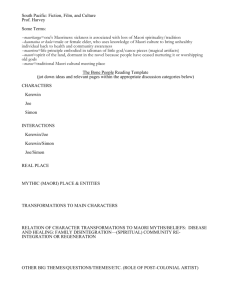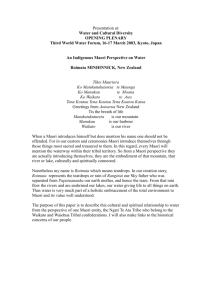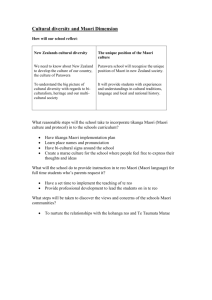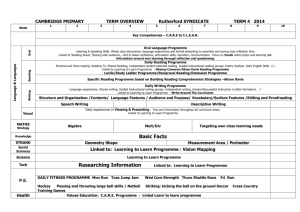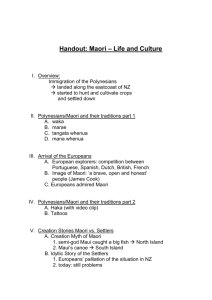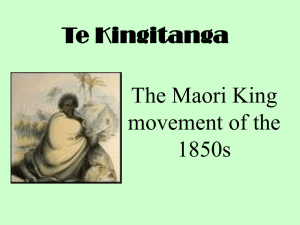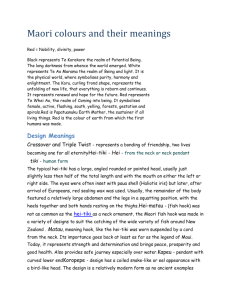Fair Access to Health Services for Māori?
advertisement
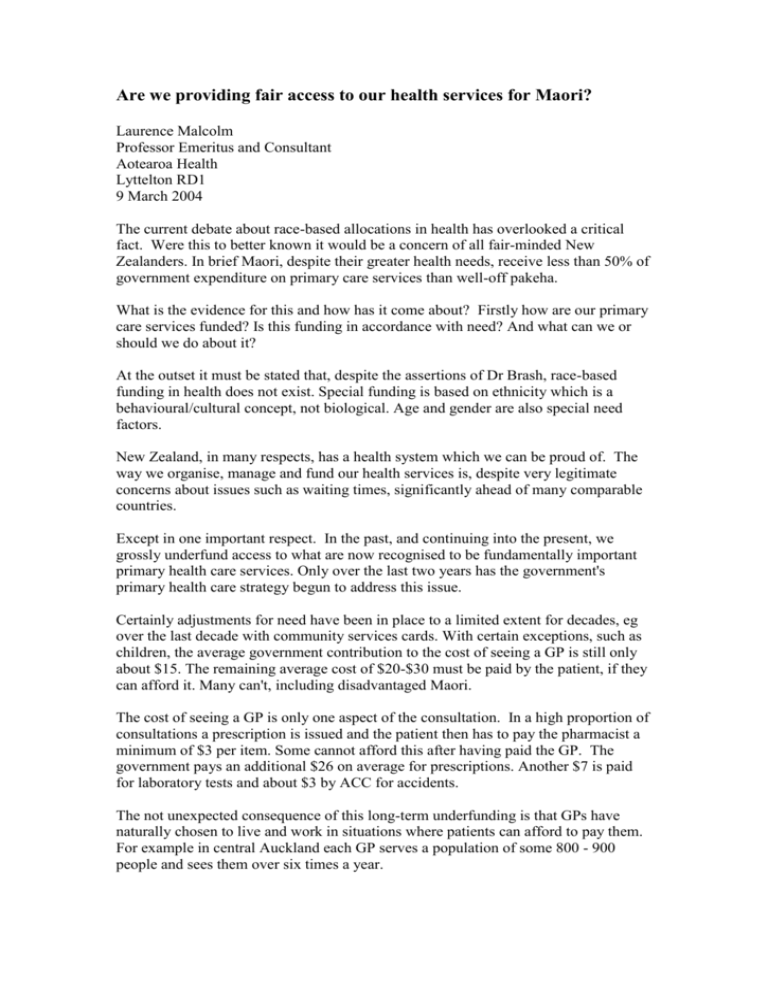
Are we providing fair access to our health services for Maori? Laurence Malcolm Professor Emeritus and Consultant Aotearoa Health Lyttelton RD1 9 March 2004 The current debate about race-based allocations in health has overlooked a critical fact. Were this to better known it would be a concern of all fair-minded New Zealanders. In brief Maori, despite their greater health needs, receive less than 50% of government expenditure on primary care services than well-off pakeha. What is the evidence for this and how has it come about? Firstly how are our primary care services funded? Is this funding in accordance with need? And what can we or should we do about it? At the outset it must be stated that, despite the assertions of Dr Brash, race-based funding in health does not exist. Special funding is based on ethnicity which is a behavioural/cultural concept, not biological. Age and gender are also special need factors. New Zealand, in many respects, has a health system which we can be proud of. The way we organise, manage and fund our health services is, despite very legitimate concerns about issues such as waiting times, significantly ahead of many comparable countries. Except in one important respect. In the past, and continuing into the present, we grossly underfund access to what are now recognised to be fundamentally important primary health care services. Only over the last two years has the government's primary health care strategy begun to address this issue. Certainly adjustments for need have been in place to a limited extent for decades, eg over the last decade with community services cards. With certain exceptions, such as children, the average government contribution to the cost of seeing a GP is still only about $15. The remaining average cost of $20-$30 must be paid by the patient, if they can afford it. Many can't, including disadvantaged Maori. The cost of seeing a GP is only one aspect of the consultation. In a high proportion of consultations a prescription is issued and the patient then has to pay the pharmacist a minimum of $3 per item. Some cannot afford this after having paid the GP. The government pays an additional $26 on average for prescriptions. Another $7 is paid for laboratory tests and about $3 by ACC for accidents. The not unexpected consequence of this long-term underfunding is that GPs have naturally chosen to live and work in situations where patients can afford to pay them. For example in central Auckland each GP serves a population of some 800 - 900 people and sees them over six times a year. By contrast in South Auckland, Tairawhiti (Gisborne district, with 45% Maori population), and the West Coast the population per GP is almost twice as high. Patients are seen only about four times a year. The direct consequence of this is a serious maldistribution in primary care expenditure, including for pharmaceuticals and laboratory services, commonly called referred services. This expenditure per person is much higher in places such as central Auckland which, despite lesser needs is about 17% above equity. Tairawhiti is about 24% below equity. This is an international pattern and is known as the ‘inverse care law’. This states that ‘the availability of good medical care tends to vary inversely with the needs of the population served’. There is clear evidence from a number of studies that this inequity or unfairness has seriously and differentially affected Maori and Pacific people. This is partly financial, but is also cultural. Initiatives during the 1990s from the then National government encouraged the formation of culturally supportive Maori providers of primary care services. Examples of these developments were the iwi-based Te Oranganui in Whanganui led by Tariana Turia. Another was the urban based development Te Waipareira in west Auckland led by John Tamihere. Patients attending these health centres were in general grossly disadvantaged and suffered from multiple health conditions. Despite these needs some had rarely seen a GP. These centres remained seriously underfunded in providing better access to GP services and the flow on referred services expenditure. Some were subsidised by iwi. Staff received income well below what would be regarded as normal for GPs and practice nurses. In other words these services subsidised what were otherwise government-funded services. Only over the last two years has there been a beginning, with the government's primary health care strategy, to address these inequities. The implementation of primary health organisations (PHOs) is now providing, in what is called ‘Access Funding’, special provision for disadvantaged populations, including Maori. But this is only access to GPs and practice nurses. As yet there is no provision for better funding related to referred services. Primary care services hence remain seriously and unfairly underfunded on the basis of need. But do Maori have special needs over and above other measures of disadvantage? Should there be an ethnic factor in funding? Recent studies have shown that there are large differences in mortality between Maori and pakeha even after allowing for other measures of disadvantage such as income. High income Maori have mortality rates 2.25 times higher than non-Maori. For low income Maori the mortality rates were 3.5 times higher. The Health and Independence Report for 2003 of the Ministry of Health indicates that overall expenditure per person on Maori and Pacific people, relative to their health needs, is less than for other population groups. There is an ethnic weighting in the funding formula of district health boards based on the very clear evidence that admission rates to hospital for Maori and Pacific people are higher than other populations. This is a fair compensation to DHBs for the extra costs associated with providing these services. Based on this evidence an ethnic factor has been quite properly introduced into the funding formula for Access PHOs. This is to enable the provision of extra services to avoid unnecessary hospital admissions for Maori and Pacific people. This is a cost that all taxpayers bear. That cost can and should be avoided through better primary health care services. Gerry Brownlee has asked for evidence of the effectiveness of this additional funding on health outcomes. This is a quite unrealistic expectation. The additional ethnic funding for hospital services just compensates DHBs for the extra costs associated with these services. It will do little or nothing to improve health outcomes. The additional ethnic-based funding for PHOs has only just been introduced. It will take years if not decades to show evidence of better health outcomes from what is still a small amount of additional money. On the other hand the question needs to be asked ‘is there evidence of better health outcomes from the above-equity funding received by well off pakeha ’? The answer here is almost certainly no. Significant resources, which might be used to improve health outcomes for Maori and other low income New Zealanders is, as discussed above, currently tied up in the inefficient and inequitable distribution of referred services expenditure. A committee established by the Minister of Health reported in 2002 on what needed to be done to address these inequities. Only recently has the Ministry of Health together with DHBs established a process to implement the recommendations of this report. Achieving a fairer distribution of resources will be difficult. However, without additional resources redistribution offers the most significant prospect for improving health outcomes. PHOs serving disadvantaged populations can spend the additional funding on smoking cessation programs, raising immunisation rates and the better management of chronic disease such as diabetes. Most New Zealanders are concerned about fairness, including the way that government resources derived from their taxation are distributed. The evidence is abundantly clear that the current distribution favours well-off pakeha and seriously disadvantages Maori. This is a cost we all must pay in the largely avoidable hospital services. A fairer, more efficient and caring health system is one which targets Maori and other disadvantaged people with more, not less expenditure.
